Jing Lee, Liberal MP, fights back over claims she is too close to China
Jing Lee on her heritage, claims she is too close to China and the Liberal infighting which saw her miss out on a big promotion.
SA Weekend
Don't miss out on the headlines from SA Weekend. Followed categories will be added to My News.
Jing Lee talks of “accusations and lies and fabrications”. That she has even been “framed”.
With a finger she draws a circle around her Malaysian/Chinese face to highlight the reason she believes she has been a victim of a “smear campaign”.
A campaign conducted not only by her natural opponents in the Labor Party, but also by the media and some of her own Liberal colleagues. She believes there was a campaign to “intimidate” her not to run for the post of president of the Legislative Council.
But why? There’s a long silence. Seven seconds.
“From a personal point of view I don’t play the racism card very often because I have been colour blind,” she says. “I think I have been caught up in a tidal wave in this sort of environment because I am wondering that if I don’t look the way I do and have a cultural background, would I be targeted?”
She stops again and laughs loudly. But it’s a laugh with no humour. It’s a laugh of bitterness and anger.
“You work it out,” she says, as if issuing a challenge. “I have been here in Australia for 40 years. I have been a member of parliament for 10 years. Why none of those been brought up until this year when the first Liberal woman with a different background seeking the top job as the president of the Legislative Council?”
The Malaysian-born Lee has been in the Legislative Council for a decade since being elected in the 2010 election when Labor’s Mike Rann defeated then Liberal leader Isobel Redmond.
Lee, 53, hasn’t been the most high-profile member of parliament. She has never courted the limelight.
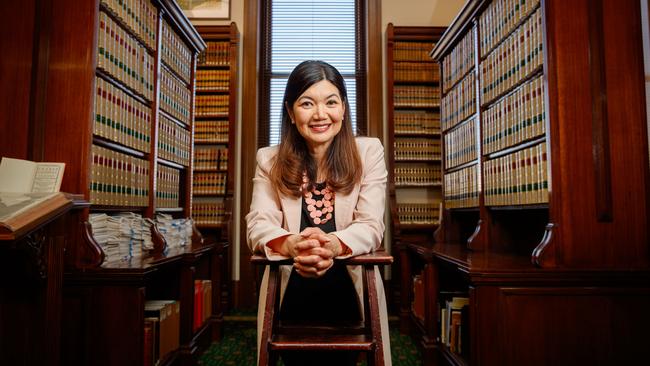
Depending on who you ask, this is either a plus or a minus. Lee says she has never sought to engage with the media, because she was too busy working hard in the background. Nobody doubts she works hard. She is a regular at the hundreds of multicultural events that are held around South Australia every year.
But, in those 10 years, she has also never been promoted beyond being a parliamentary secretary or assistant minister. Lee has never made it into Cabinet or even Shadow Cabinet, being passed over many times for less experienced MPs.
However, all that anonymity evaporated in August when she became headline news. The catalyst was two-fold. Lee had been put forward by her party to become president of the Legislative Council, replacing Terry Stephens who had quit amid the country members’ allowance scandal.
Before the Upper House vote could take place, stories emerged that Lee had allegedly aligned herself with the Chinese government, that she was too close to the SA Xinjiang Association, which denied the human rights abuse of the Uighur people, an ethnic minority within China, and had then refused to meet the Adelaide-based representatives of those same repressed people.
That she was close to organisations linked to China’s United Work Front, an outfit that aims to increase China’s influence through using members of overseas Chinese communities and is seen as a proxy for that country’s ruling Communist Party.
Then, to top it all off, three Liberal MPs wrote to their own party demanding any alleged links Lee had to China should be investigated.
Federal MPs Alex Antic, Nicolle Flint and Tony Pasin wrote to the party’s state executive, saying any “links must be independently investigated, as a matter of urgency, by the Liberal Party of Australia (SA Division) to ensure the integrity of our Party”. No such investigation took place.
It is believed former SA Liberal party, and now federal party, president John Olsen reported verbally to Liberal state executive that the matter had been taken up at state and federal level, and the advice was that it was not a matter of concern.
Sitting in a meeting room on the first floor of Parliament House on North Terrace, Lee says she is still flummoxed by the actions of Antic, Flint and Pasin.
“I was shocked,” Lee says. “You ask me the reasons why I think they have done it? I don’t know. I was just shocked and totally disappointed.”
Did they try and contact her before going public?
“No. That’s why it’s particularly disappointing. I know them reasonably well. They could have just picked up the phone and had a chat.”
Lee says she is still waiting for any of them to contact her.
She says she is also appalled by how the story was reported in the media and by the actions of the Labor Party, especially that of its Government Accountability spokesman Tom Koutsantonis, who held a press conference to say “The Opposition isn’t saying that Ms Lee is a Chinese spy or a Communist Party sympathiser.”
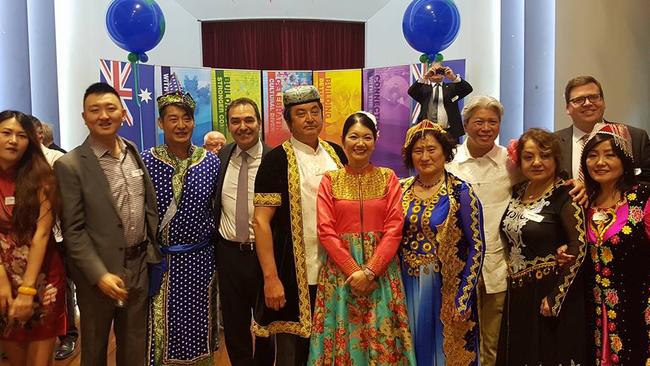
“What sort of language is that? I mean that’s disgusting,” Lee says.
Lee doesn’t believe the timing of the attacks on her credibility were coincidental, coming a few weeks before the vote for the Upper House presidency.
“I think the game was to intimidate so much, intimidate me so much, that I would not even bother (running),” she says.
The accusations and insinuations against Lee were various.
That she had warned colleagues not to engage with Chinese spiritual group Falun Gong because it might upset Beijing.
That she advocated for SA to sign up to the Belt and Road initiative, where China’s government invests in infrastructure in foreign countries. Victoria has already signed up to the program.
Then there is her association with the SA Xinjiang Group – the group that denies the Muslim-minority Uighur population in China is persecuted by the country’s government. Australia’s Foreign Minister Marise Payne, in a speech to the United Nations in September, spoke out against “repressive measures enforced against Uighurs and other ethnic minorities in Xinjiang” by the Chinese government.
There are well-founded reports that as many as one million Uighurs in the country’s far west have been rounded up and sent to what the Chinese government calls “re-education” camps, but what many believe are “concentration camps”. China says the Uighurs are receiving “vocational training” to combat terrorism and extremism.
The honorary president of the SA Xinjiang Association is businesswoman Irena Zhang. Zhang is unapologetic in her support of the China Communist Party in its treatment of the Uighur people.
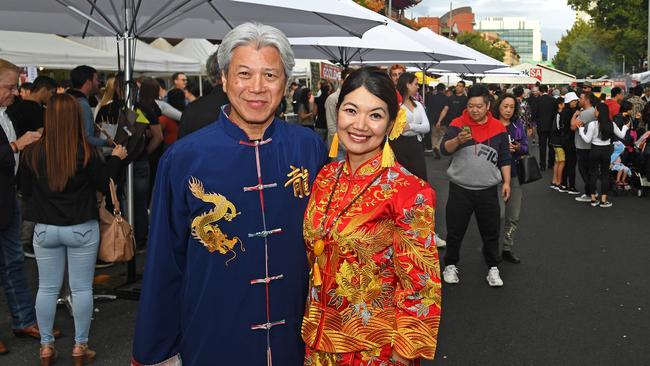
“In my opinion, I don’t think they are being mistreated,” Zhang tells SAWeekend. “The initiative is to give them (the Uighurs) some skills, that is how I see it. Whether it’s voluntary or not voluntary, we don’t know that.”
Lee has been to many Xinjiang functions, been photographed with them many times. Dressed up in Uighur costume.
Last year, she addressed the association’s 10th anniversary dinner, representing Premier Steven Marshall. China’s Consul-General in Adelaide, HE Lanjing, also spoke at the event.
Lee’s defence is that she goes to many different multicultural functions. And she shouldn’t be lumbered with the assumption that she shares political views with them all.
“I meet so many organisations,” she insists. “To think that I am associated or guilty one way or the other, based on assumption and guilty by association, that is totally ridiculous assertions.”
She says she condemns China’s treatment of the Uighurs. And says politics has never been discussed at any Xinjiang function she has been to.
“Any country that violates human rights issues concerns me,” Lee says. “We have so many communities that flee from persecution in their countries. There is the Afghans, the Pakistani community and, of course, the Uighur people and other community groups that’s been persecuted and have had human rights violated. It is not acceptable and we all need to be, every country needs to be, better corporate citizens. And China is included.”
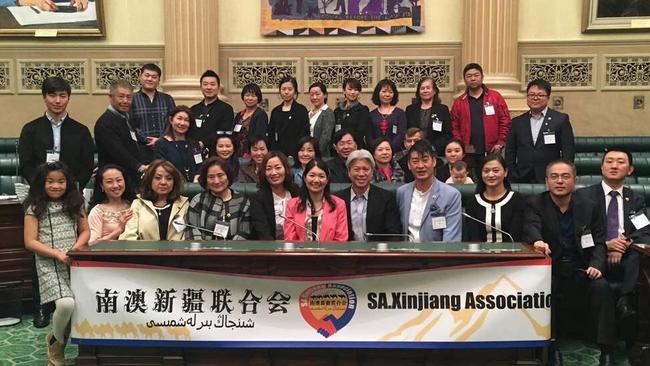
Feeding into the background of the Lee story are two more factors. One is Australia’s deteriorating relationship with China. China is making it increasingly difficult for Australian exporters to sell products into the world’s most populous market and Australia’s biggest trading partner. Tariffs imposed on wine exports are the most recent example.
The other is what is regarded as China’s overt and covert attempts to increase influence within Australia.
Last year, the outgoing chief of the spy agency ASIO, Duncan Lewis, wrote that China was seeking to “take over” Australia’s political system.
“Espionage and foreign interference is insidious. Its effects might not present for decades and by that time it’s too late. You wake up one day and find decisions made in our country that are not in the interests of our country,” Lewis said.
Lewis cited the case of former Labor senator Sam Dastyari. Dastyari quit in 2017 over his relationship with political donor Huang Xiangmo, who had links with the CCP. Dastyari defended China’s action in the South China Sea, in defiance of ALP policy, and tipped off Huang that he was being the subject of surveillance by government agencies and possibly the US. Huang has since been banned from Australia on national security grounds.
Other MPs have also been caught up in arguments about potential China influence. Victorian Liberal MP Gladys Liu, the first Chinese Australian woman to be elected to the Lower House, was accused of being too close to an organisation with links to United Front. Federal police raided the home of NSW Labor MP Shaoquett Moselmane as part of an ASIO investigation into possible Chinese Communist Party influence. Moselmane has not been accused by police of wrongdoing.
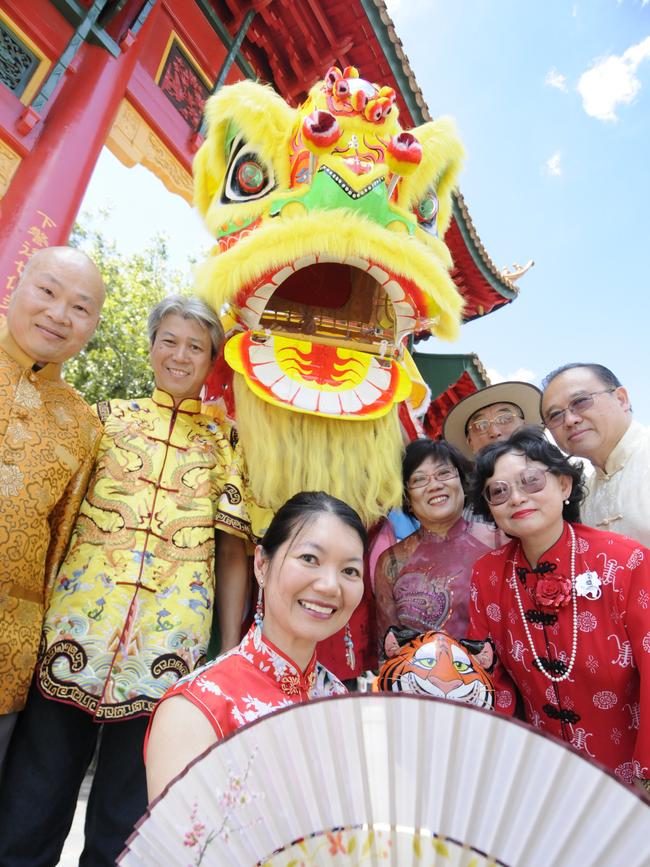
In November, long-time Victorian Liberal Party member Sunny Duong was charged with “preparing an act of foreign interference”, under laws that were introduced in 2018, that had allegedly targeted Morrison government Cabinet minister Alan Tudge.
In June, Tudge appeared at an event where Duong handed over a $37,000 cheque to the Royal Melbourne Hospital on behalf of the Oceania Federation of Chinese Organisations from Vietnam, Cambodia and Laos Inc. That body is also believed to be linked to United Front.
Australia’s relationship with China came under even more pressure this month when a Chinese foreign ministry spokesman tweeted a doctored image of an Australian soldier holding a bloody knife to the throat of an Afghan child.
“I think the tweet is inflammatory, it’s not acceptable, it’s not diplomacy,” Lee says. “It’s disappointing. I believe they (the federal government) take a strong stand and it’s probably necessary because as a country we shouldn’t be intimidated by any government.”
Lee wasn’t born in China. Neither were her parents. Her grandparents emigrated to Malaysia from China to escape poverty. Her mum’s parents were from Hainan Island. Her father’s ancestors are Hakka people from southern China, and Lee describes them as “gypsies”.
Lee moved to Adelaide in 1979 when she was 13. Her father, who died in October, was a martial arts and tai chi instructor, and she landed without English language skills. For her first three months, Lee went to an English language school at Gilles Plains before moving to Marden High.
It was a tough time.
“I was the only Asian kid at school,” she says. “Being the only Asian face is pretty bad. I didn’t have any friends for the first three months. Nobody wants to talk to me. I was bullied. I go to school and I will be called ching chong, ching chong.”
Lee said she stopped the bullying by standing up for herself one day in a home economics class.
In her first parliamentary speech, Lee said she “had a fight with a classmate who took the biscuits that I had baked in a home economics class”.
“I threw the cookie tray onto the floor. I shocked everyone, including myself.”
The next day, she says, other students were giving her pats on the back and saying “good on ya”. She was even asked to join the school football team.
Lee took a business course when she left school and her first job was at the South Australian Tourism Commission before moving to Kuala Lumpur to work as the general manager of a business centre that rented space to companies looking to establish a Malaysian office.
“That was another culture shock, going back,” Lee says. “Things were familiar but at the same time strange and different.”
She stayed in Malaysia for five years, coming back to Adelaide when the Asian financial crisis of the late 1990s hit.
Lee found a job with the SA Economic Development Authority and became heavily involved in multicultural events. Lee also became president of the Asia Pacific Business Council for Women and a vice president of the Hong Kong Australia Business Association.
It was after she had been emcee at a Lunar New Year celebration in Chinatown that she was approached by then Liberal leader Martin Hamilton-Smith. He wanted her to run for politics.
“She’s a pretty smart, capable person, pretty savvy commercially,” Hamilton-Smith says. “You couldn’t have a better example of a migrant who has become a terrific Aussie than Jing.”
Hamilton-Smith says he had plans for Lee, “a real talent”, but that came to an end when he was flicked as leader by his party. He believes she should have been elevated into Cabinet long before now, and that, if she had, the messy battle over the Legislative Council presidency would have been avoided.
Hamilton-Smith, a former Lieutenant Colonel in the SAS, has no doubts about Lee’s commitment to her adopted country.
“I have no questions about Jing’s Australianness and her total commitment to the South Australian parliament and the South Australian people,” he says. “One shouldn’t be parodied over race or national heritage. We have been having that conversation in Australia since federation and we are better than that as a nation.”
Lee has not been short of powerful supporters. Premier Steven Marshall, to whom Lee is assistant minister, said she was an “outstanding Australian”.
Former Defence Minister Christopher Pyne wrote in a column in The Advertiser that Lee’s treatment reminded him of the “reds under the beds” scare campaigns in the United States in the 1950s. “This new era of ‘red baiting’ has no place in our society,” he wrote.
Newly installed Finance Minister Simon Birmingham said Lee “in no way deserves to be the target of destructive behaviour”.
Lee’s defenders believe she has been targeted for internal party reasons than any genuine concern that she is a mouthpiece for China.
The letter writers, Senator Alex Antic, Nicolle Flint and Tony Pasin, all declined to expand on the thinking behind the letter. Pasin adding that any “failures” in how the letter was reported by SAWeekend “will result in the immediate instigation of proceedings”.
Lee has also received support from some in the multicultural community.
Ahmed Zreika, the president of the Islamic Society in South Australia, wrote to Steven Marshall to express his organisation’s support of Lee.
“It is shocking to learn that anyone would have taken terrible steps to tarnish Jing’s reputation,” Zreika wrote. “As a Muslim community, together we have exhausted all avenues to convince and educate the wider community that not every Muslim is a terrorist. Therefore, without a doubt, I do not believe that every Chinese person or anyone who has an affiliation with a Chinese person is a member or support the Chinese Communist Party, and unfortunately it appears some people are playing this game with Jing.”
Not all are convinced about the people Lee mixes with though. Nurmuhammad Majid, is president of the East Turkistan Association of Australia, and represents the Uighur people in South Australia.
Majid says the SA Xinjiang Association has hijacked his culture and is a front for the China Communist Party. “(It’s) purpose was to spread falsified Chinese propaganda messages about the situation of Uighur people in East Turkistan”.
“This group engages with activities beyond the criteria of multiculturalism in Australia, but purely playing bridging platforms between Chinese state sponsored individuals and organisations to establish relationship with South Australian politicians, parliament members and other government entities,” Majid says.
He says he has struggled to have a meeting with Lee, although one was arranged, but was cancelled because of COVID lockdowns. A new date is being sought.
Majid won’t say Lee is deliberately working to help the Chinese Communist Party but says, like others, the MP is being used by Beijing.
“My recommendation for Jing is to stay away from CCP otherwise you are going to be poisoned,” Majid says.
Lee scoffs at the notion she could be of any use to the Chinese government.
“If I’m really wanting to have influence in the foreign sphere internationally, I would have been federal member of parliament,” she says.
“I am not in a position to change some of the things that is happening internationally and some of the things that are happening between Australia and China. That’s really up to my federal colleagues.”
In all the furore, Lee didn’t win the presidency of the Legislative Council. Long-time Liberal John Dawkins, who had long coveted the job, defied his party and also put himself forward for the job in opposition to Lee.
Dawkins would win the job when his name was drawn out of the hat after two tied votes.
He was also suspended from the Liberal Party for ignoring the party’s wishes.
“I would never do what John did in terms of colluding with the opposition to get where he was,” Lee says.
Lee believes all the publicity in the lead- up to the vote for the presidency cost her the job. She says it may have swayed the vote of a crossbencher or two.
The attacks, she says, may even have encouraged Dawkins to run, thinking she was a weakened candidate.
She says she is proud of herself for continuing the fight and not giving up, even though she believes that is what some expected her to do.
“So I had to work, now under pressure, with all these things throwing at me. I had bullets shooting at all corners and I wasn’t entirely sure where the bullets had actually come from,” she says. “I didn’t back down. I didn’t even break down.”
The anger in Lee is still palpable a few months after the event. She is angry her loyalty to Australia would be questioned.
“It’s not nice, it’s not nice,” she repeats. “It’s not a nice thing, OK, to be accused, to be kind of framed.
“It sounds like a fictional story but unfortunately I have been caught up among all those smear campaigns. Which is really sad, really, really sad.”




